Martin Edwards's Blog, page 40
July 12, 2023
Operation Diplomat by Francis Durbridge
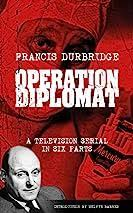
I've said plenty of times how much I enjoy the 'cliff-hanger' serials written by Francis Durbridge. Maybe they stretch plausibility to the limit, maybe they are a guilty pleasure, but they are a lot of fun. Williams and Whiting have done a great job in reprinting many Durbridge titles, including some that haven't seen the light of day in book form before. The latest example is Operation Diplomat.
A useful intro by Melvyn Barnes, the leading expert on Durbridge, explains that the original TV serial was a follow-up to the better-known The Broken Horseshoe, and was broadcast in six episodes by the BBC towards the end of 1952. The original cast list is included and I noted several familiar names, such as Raymond Huntley and (in a minor role) Roger Delgado, later famed as 'The Master' in Doctor Who. The story was later filmed, but has never appeared in book form before.
There is a dramatic opening, with a dead body on the floor of a flat owned by Mark Fenton, the doctor who is the main protagonist. The deceased, also a doctor, is a man called Edward Schroder, and Fenton is trying to explain to Inspector Austin the extraordinary sequence of events which preceded Schroder's death. In a nutshell, Fenton was kidnapped in order to perform a life-saving operation on a famous diplomat called Sir Oliver Peters. Schroder warned Fenton that his life was in danger - but Schroder was the one to be shot.
I enjoyed this one, especially because the cliff-hangers are really attention-grabbing. In one or two instances, the subsequent resolution of the dramatic climax was slightly underwhelming, with red herrings abounding, but appreciating Durbridge to the full does require the regular suspension of disbelief. This story was entertaining enough for me to be very glad to go with the flow. Congratulations to the publishers for making it available to a new readership.
July 10, 2023
A Year to Remember

I celebrated my birthday on Friday with a delightful boat trip to Greenwich in the sun. A wonderful day, and also a peaceful opportunity to reflect on the past twelve months. A full year has passed since a motorbike struck my car in a hit and run accident that by some miracle left me unharmed physically, although the shock of the incident has stayed with me much longer than I expected, perhaps much longer than seems entirely logical.

The bike incident happened at the end of a truly marvellous week in which I'd received the CWA Diamond Dagger and met up with friends from my youth at a Balliol College Gaudy, and was a stark reminder that life can change in the blink of an eye. In particular, that incident has had the effect of making me more grateful than ever for each day (especially each day of good health), and motivating me to do as much as I can in the time available. I like to think I've always appreciated my friends and family, but again the crash has reinforced my awareness of just how much I owe to their kindness and support. It really does help in so many ways.
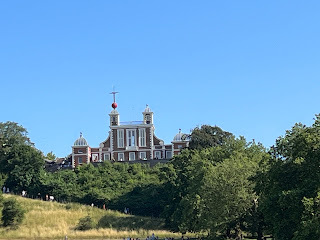

Strangely enough, I can't help feeling that the last year has been about the best I've had. There are some specific reasons for this. To my amazement I've received four awards and four nominations for my writing, as well as taking part in some fantastic events and other experiences, not least the Edgars banquet in April. As for Christmas University Challenge, it's something I'll never forget. If I'd scripted the series myself, I wouldn't have dared to write what actually happened. And I've even had my first (and perhaps only!) audio drama recorded by some terrific actors- more about that when the show is actually released, which may yet take a while.

And there are some less tangible reasons as well. Rightly or wrongly, I believe that I'm writing better than ever. The ideas keep coming and the main challenge is finding enough time to turn some of them into stories - even since I came back from London, I've been offered a fascinating commission from the US, which I hope to accept if time permits. I've had a huge amount of good fortune, and although my inner pessimist reminds me that one never knows what lies around the corner, I do feel rather humble as well as grateful to have had the chance of so many magic moments. So to everyone who has contributed to a very happy year - thank you. And now that's enough introspection for the time being - on with the next piece of writing!

July 5, 2023
The joys of book dealing - an interview with Stephen Conway

I love second hand bookshops and one of the many pleasures of my recent trip to Shetland was the chance to visit a lovely new second hand bookshop on the island. It's really heartening to see people moving into this fascinating trade - reports of its death have been greatly exaggerated, I'm delighted to say. A few weeks ago, I was glad to host Stephen Conway on this blog when he talked about his great passion, bookbinding. Stephen has moved into dealing in second hand books, and his premises at Halifax now hold some mouth-watering titles. I interviewed him recently by email about this branch of his activities. Here's what he had to tell me:
1. What first led you into book dealing?
For a long time now, several years in fact, I have wanted toopen and run a small bookshop. It seems to be a natural route for Bookbindersto take. Being based in Halifax, West Yorkshire, I follow in the illustriousfootsteps of Edwards of Halifax, world renowned Bookbinders and Booksellers,most notably known for their For-edge paintings and painting under vellum. Itis surprising how much knowledge one accumulates over time, especially havingworked with rare and valuable books over many years.
With impeccable timing, we finally made the decision to openour new Bookshop in 2019, just two weeks before the first Covid lockdown. Wecouldn’t have planned such a scenario had we tried.
However, moving forward, this realistically gave us thebreathing space to work on our stock and our online presence and withhindsight, this was not a disaster and in fact, has worked out well.
Without doubt, the majority of our sales are online, asexpected. However, our Bookbinding business already has its own premises, soany alterations have been internal only. We have a large frontage, with sixlarge windows to view. As planned, we down sized the Bindery to create a largebookshop space internally. We now have four book rooms with more planned overthe short term.
Our strength we feel, lay in the fact that we can produceour own fine bindings to sell in the shop/online and also that we can repairand rebind books in poor condition, either for ourselves to sell through theshop or for our customers.
A part of our bookbinding business is box making,particularly for valuable first editions and many Private Press editions. Thisis something relatively unique that we can offer to our customers and hasproved popular.
As a relative newcomer to book dealing, my thoughts on thematter are, as yet, not fully formed. Looking at online sales, we seem to sella healthy cross section of subjects across a full price range. Our shop hasmany more books than we have online and I am constantly amazed at which titlessell and which don’t. For us, condition is important and as a general rule, wedo not put books out which are inferior. Books which are signed tend to bepopular, especially with modern fiction and our own fine bindings have alsobeen well received.
Whilst we have a good selection of crime novels,particularly in the shop, we would not class ourselves as crime specialists.Like many other book dealers, we are constantly on the look -out for earlysought-after titles, particularly in good condition. As you know, crime novelsare popular with collectors and collectible titles in good condition commandhuge prices. Without comprehensive knowledge of this area of book collecting, weare keen to avoid costly mistakes. At the moment, gently, gently!
As a lifelong book collector, I was already aware that thecondition of the dust jacket is important. What has been an eye opener is thefact that this can be a game changer, significantly reducing the price if inpoor condition. Even with books just a few years old, spines can be very badlyfaded if stored in direct sunlight. As a shop owner, with several windows ofdisplay, this is a problem.
6. What advice would you give to anyone who was interested incollecting crime fiction?
For the established collector, they will be aware of some ofthe pitfalls associated with collecting. Obviously, condition is paramount, butso too is rarity, signed copy, inscribed, association copy etc.
People collect books for many, many reasons; a particularauthor, signed copies, dust jacket artwork, a particular illustrator etc. Thegreat beauty of book collecting is that there is something of interest foreveryone, regardless of price.
July 3, 2023
Guest Blog - Nina Wachsman on 'Frenchman's Creek'

Something a little different today, a guest blog from Nina Wachsman (pictured). Nina is a former art director and illustrator in New York City, and also the author of two novels of historical suspense, set in 17th century Venice, The Gallery of Beauties and The Courtesan’s Secret. Both novels feature a pirate and his lost romance with an elite courtesan of Venice. Over to you, Nina!
"'Last night I dreamt Iwent to Manderley again. ' is the unforgettablefirst line from the Daphne du Maurier novel, Rebecca. It was not the first or the only book of du Maurier’s Iread as an adolescent, or the one I cherished most. Frenchman’s Creek, a historical novel about a secret romancebetween an English lady and a French pirate, had always been my favorite, andinfluenced my own writing.
I recently rediscovered Frenchman’s Creek when I found it lying on top of the pile of booksin my building’s laundry room, the adhoc lending library for all of us tenants.Wondering how well the novel would read to a world-weary adult, I read it withtrepidation, hoping the magic was still there. Thankfully, it still has thepower to entrance me as it did when I first read it.
Like Rebecca,Frenchman’s Creek has the same moody, brooding blustery Cornwall setting.In each novel’s opening paragraphs, unnamed narrators reminisce over the ruinsof a great manor house, conjuring the ghosts of those who once lived there. In Rebecca, the narrator is the heroine,who recalls a crisis long past and now resolved, while the narrator’sdescription of the ruins of Navron house in Frenchman’sCreek suggests how the story will end –an adventure destined to become adistant memory.
The Frenchman of the title is a piratenotorious for raiding the towns and estates along the English coast, and whoseship has taken refuge in a hidden cove. The cove is at the end of a creek,which lies in a section of the estate of an English noblewoman. Lady Dona St.Columb, who rarely visits, has recently moved her household to the estate toget away from her boredom with her husband and Regency London. The Frenchpirate she discovers hiding out on her property is no rascally Jack Sparrow,but a gentleman who sketches birds and reads poetry, and only indulges inpiracy for the sake of adventure. Frenchman’s Creek was first published in1941, and made into a movie in 1944, starring Joan Fontaine as Lady Dona.
The Frenchman’s bravery, intelligence and loveof adventure are a in contrast to Dona’s husband, a good-natured but simple fopwho is oblivious to the lust his unsavory companion has for his wife. In theFrenchman, Dona finds a man and a life which could fulfill her, but she is tornby her desire for freedom and escape, and a mother’s ties to her children.
The lush descriptions of the creek, cove, andNavron House add to the feeling of love lost –not only for a woman’s romance,but for the beauty of the countryside as it once was. Because of du Maurier’sode to the Cornish countryside in Frenchman’sCreek, I promised myself I would one day visit Bodmin. I have yet tofulfill that promise in reality, but re-reading Frenchman’s Creek, transported me there once again."
June 30, 2023
Forgotten Book - The Missing Moneylender aka The Man Who Was Dead
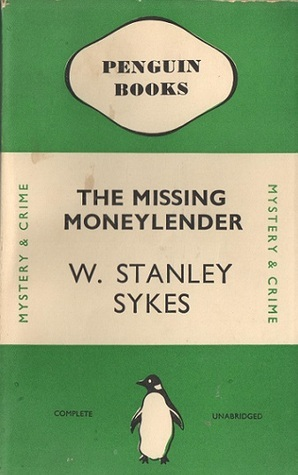
I've avoided reading The Missing Moneylender, by W. Stanley Sykes, for a long time. A blog post I read about it suggested that the story is hopelessly antisemitic and I've read more than enough Golden Age books featuring Jewish moneylenders in a tediously stereotyped way. However, when I saw a green Penguin copy in a nice Shetland second hand bookshop, I did another check and found other reviews that very favourable. The excellent Vintage Pop Fictions blog, for instance, says it's doubtful that 'even the most politically correct reader could find anything here to worry them'. In the current climate, that seems over-optimistic, but John Norris, another blogger of distinction, mounts powerful arguments in defence of the book, noting that the characterisation is more vivid than was customary in detective stories of the time.
Now I've read the book, which was first published in 1931, I must say that I think that it is a first novel which, despite some flaws, is most definitely a cut above the typical Golden Age debut, despite the inclusion of a few casual descriptions that add nothing to the story but no doubt prompted the criticism. Other commentators have pointed out that Sykes produced a sort of hybrid between Croftsian police investigation and a sort of impossible crime mystery. There's a general consensus that it's difficult to say too much about the storyline without giving spoilers.
It's not really a whodunit - the main interest lies in howdunit. Sykes was a doctor with expertise in the field of anaesthetics and he puts his know-how to good use. Even more importantly, he writes in an agreeably readable style, so this is a quick and entertaining read, with a number of good plot twists.
Sykes (1894-1961) wrote just three novels and a few short stories - I've not read any of his other fiction, and it's hard to find. After the 1930s he concentrated on non-fiction and wrote a seminal three-volume history of anaesthetics. Suffice to say that if you like Richard Austin Freeman, you'll almost certainly enjoy this novel.
June 28, 2023
The Art of the Whodunit
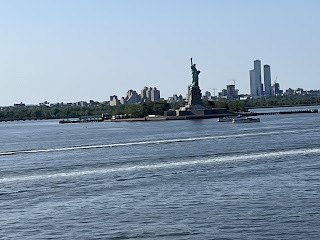
The last few weeks have been full of enjoyable things - I've been really lucky, and the gorgeous weather has been a bonus. A special treat was to lead a programme on The Art of the Whodunit for Road Scholar. I did this a couple of times before the pandemic, but four further programmes were cancelled because of Covid. However, the third programmes was perhaps the best of all.


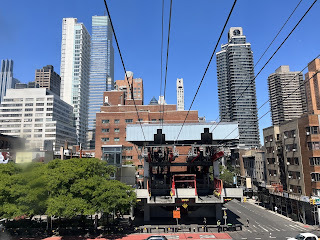

A memorable trip began with a flight to New York City and a day spent wandering, via Central Park, to Roosevelt Island. You reach the island by tram (more like a cable car) and among other things the island has a spooky Gothic building and former smallpox hospital which were very thought-provoking. The sort of places Rachel Savernake would relish. Then we met the 19 very pleasant people who had signed up for the course - about the ideal number, I'd say. It was great to work again with Chris Ball, who handles all the logistics with unobtrusive efficiency. And it was an unexpected pleasure to greet Judith Falco, who had taken part in the last programme as well. A glutton for punishment! Anyway, it was lovely to have another chance to enjoy her company.


The following day we embarked on the Queen Mary and the day after that I gave the first of seven daily lectures. Crossing the Atlantic by sea is a wonderful experience and the ship offered many delights, as usual. It was also good to see Giles Ramsay again; he was leading another tour. There was a third Road Scholar tour, led by Spencer Jones, a military historian whom I met for the first time. On landing at Southampton, I was greeted by the welcome news that the Daily Mail had given Sepulchre Street a rave review. We then headed for Oxford, where we spent five days at a hotel ideally located, close to the river and Folly Bridge.
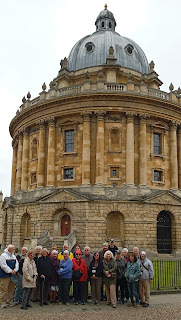

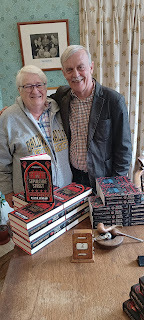
Highlights of the Oxford leg of the journey including a boat cruise and a visit to the top of the Sheldonian, as well as wandering in the sun around the Parks, along the canal, and through Christ Church. We were given a special tour of Balliol, with the posh silver out on display, and also allowed to visit the Gaffer's Room in Blackwell's, where I did a book signing. The weather was perfect and the company delightful. Definitely a privilege to be a part of it.
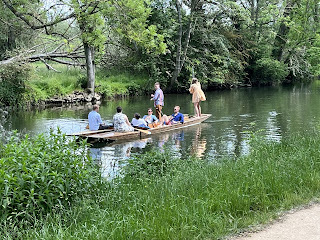
June 26, 2023
Bodies from the Library 2023

Over the past four weekends I've enjoyed the company of fellow crime fans in a variety of splendid settings - in Oxford (more of which before long), at Gladstone's Library, on Shetland, and most recently at the British Library, where the latest Bodies from the Library event was held. As always, the team of John, Mike, Mark, Susan, and Liz did a great job.
An enjoyable precursor to the event had been a lunch on Friday with the Library's Publications team, and I'm glad to say that the Crime Classics series is continuing to go well. Sales are still very good and we have a number of exciting titles under consideration, as well as several ideas for anthologies. More about these at a future date. On Friday evening, there was a pleasant meal with John Curran and others whom I haven't seen for quite a while.
The first event on Saturday was a discussion by Simon Brett and Len Tyler about some of the more flawed examples of Golden Age fiction (Gladys Mitchell took quite a hammering...) and then Chrissie Poulson and I discussed 'singletons' and the reasons why some published crime writers never return to the genre. Tony Medawar gave a characteristically well-researched talk about S.S. Van Dine, while Kate Jackson discussed her (very enjoyable) new book with Jake Kerridge.
After lunch there was a good episode from the Alfred Hitchcock TV series based on a Dorothy L. Sayers short story, a discussion about Clifford Witting, a talk by Tom Mead about two hard-to-find locked room mystery novels, a discussion by Jim Noy about 'fair play' and a jolly presentation by Dolores Gordon Smith about Captain Hastings' hidden depths. A panel of us answered questions at the end and then there was a wine reception organised by Maggie Topkiss of Felony and Mayhem, honouring two pillars of the crime community, including Tom Schantz, who died recently.
It was great to see some people I've not met for ages - such as Tina Hodgkinson (from whose Twitter feed the above photo comes) and fellow writers Kate Stacey and Christina Koning - as well as having the chance to meet Maggie for the first time. I was also very glad to meet Lauren Schwartzman, who told me she was a member of the Corpus Christi team which famously won University Challenge in 2009 only to be disqualified on a regrettable technicality. There were plenty of other pleasant conversations, often all too brief, but it's so good to be meeting people again after the long gap caused by the pandemic. A great day.
June 23, 2023
Forgotten Book - The Brazen Confession
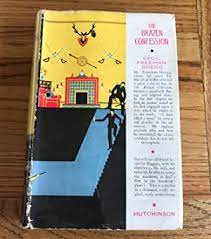
It is safe to describe Cecil Freeman Gregg (1898-1960) as a forgotten author. He was, in fact, one of the genre's few accountants (Richard Hull was another) and he enjoyed a long career. The Murdered Manservant, his first book, appeared in 1928 and his last, Professional Jealousy, in the year of his death. It seems that he may have only had two publishers in that time, Hutchinson and Methuen, and I'd have thought they both rank as a cut above some of the competition. So Gregg is not an insignificant figure.
I was tempted by a lovely inscribed copy of one of his earliest books, The Brazen Confession. He was barely past 30 when he wrote it and the story brims with a young man's energy. It also features one of his main series characters, the formidable Inspector Higgins. But what appealed to me a good deal was the opening premise.
This begins as an inverted mystery. An author is writing a confession to murder. His name is Scott and he exults in his success at having committed the crime and got away with it. Hence the title of the book. It's clear that Gregg was trying to do something fresh here. This wasn't the first crime novel to be written from the killer's point of view, although it did appear a year before Francis Iles' highly influential Malice Aforethought. But writing in the first person was a bold move and after about sixty pages we move to a more conventional third person narrative.
The book is, I discovered, much more a thriller than a study of criminal motivation. The gusto of the writing carries the story along, but I don't think the potential of the premise was maximised. Gregg wanted to write one kind of book and I was hoping for something different. So, not his fault but not a masterpiece, either. However, I'd say this is an interesting example of a young writer flexing his literary muscles and I'll certainly be glad to take a look at some of his other work.
June 22, 2023
Shetland Noir

I'm back home briefly - before setting off for Bodies from the Library - after a wonderful trip to Shetland Noir, my first ever visit to Shetland. Over the years I've heard a great deal about the islands from Ann Cleeves and they certainly lived up to their advance billing. A couple of guided tours, with Ann driving, were a very special bonus, as was the wonderful weather. In the photo below, that's St Ninian's Isle in the background. Jahrlshof is in the above photo.
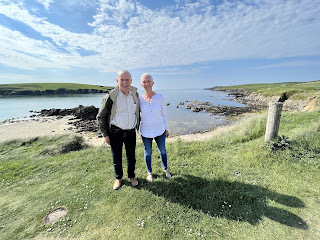

The festival took place at Mareel, the home of Shetland Arts, and it was gratifying to be greeted as a 'headliner' and to be interviewed by Ann, as well as being asked to interview Richard Osman. There was a shock on Saturday morning, when Richard emailed me to say that his flight was cancelled and he wouldn't be able to make it. Thankfully, the tech experts at Mareel were able to reorganise, so that we conducted the interview by Zoom. Richard couldn't see either me or the audience, but we could see him, and in the circumstances it all went very well, with very pleasing feedback.
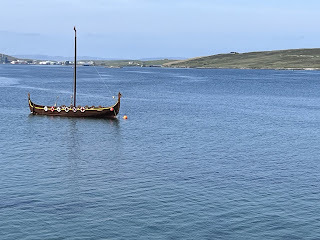
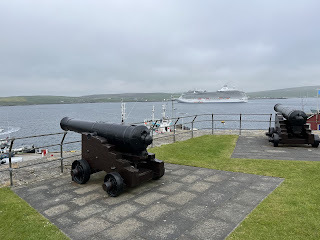
It was great to see the likes of James Grieve, Val McDermid, Wendy Jones, Verena Rose, Jason Monaghan, Elly Griffiths, and Shari Lapena again, as well as to meet some of the Shetland-based enthusiasts. Marsali Taylor, who lives on Shetland, where she sets her books, was a key organiser, while Ann was the patron of the festival. There was an enjoyable welcome reception and also a farewell event, for which I set a quiz....

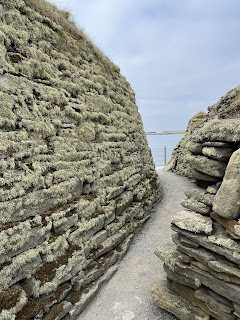



In the time available, it was impossible to see everything the Shetland islands have to offer, but highlights included a visit to the astonishing archaeological site of Jahrlshof, Scalloway, and a splendid second hand bookshop (Kergord Hatchery by name) in the middle of nowhere, which had an excellent stock. Ann and I were invited to inscribe the glamorous cow in the shop's lobby with the names of favourites among our novels. And I made several purchases... For the duration of the trip, I felt very at home in a self-catering annex in a glorious setting just outside Lerwick (the view from the window is in the third photo below). Lerwick itself is a fascinating old port, and looked lovely in the sunshine.
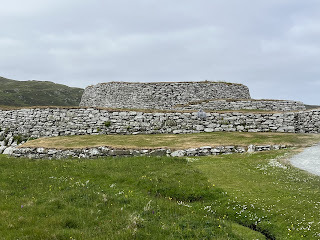
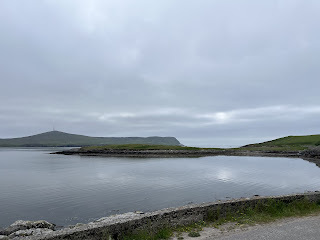
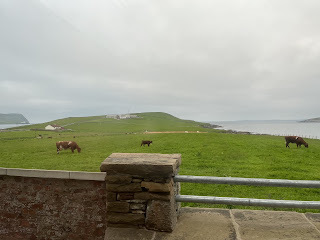


All in all, an unforgettable trip. I'm truly grateful to have been invited.

June 21, 2023
The Nest - 2020 film review
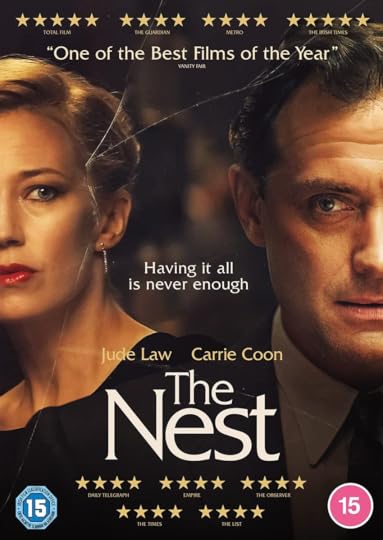
One can look at The Nest in different ways. On the one hand, you might argue that it's a 1980s drama that brims with potential but ultimately peters out. On the other hand, you might counter that it captures human behaviour subtly and compellingly, and is mature enough to avoid the simplistic. I'm in the latter camp. This is, I think, a really good film.
I was drawn to it partly by the presence in the cast of Jude Law. His raffish, unreliable charm is, in his best performances, utterly convincing and never more so than here. He is Rory O'Hara, a charismatic trader with a gift of the gab. But it rapidly becomes clear that he's economical with the truth and before long we start to wonder if he's a full-on fantasist.
Rory is married to Allison (Carrie Coon), an equestrian trainer. They have a son together (Ben) and she also has a teenage daughter (Sam). They are living in New York and it all seems pretty idyllic. But warning signs flash when, at the start of the film, Rory says he wants to move back to Britain to pursue a great opportunity and we learn that he is temperamentally restless - and in charge of the family finances.
They do move to England, and take a tenancy of a baronial manor. Rory rejoins his old boss Arthur (a terrific cameo by Michael Culkin) but the children are unsettled. Carrie Coon is excellent and there's alos a great cameo from Anne Reid, whom I still think of as Val Barlow in Coronation Street. At different times the film teeters on the edge of psychological suspense, satire, family drama, horror, and the supernatural. We expect something terrible is going to happen...well, no spoilers here. It's definitely worth watching The Nest for yourself.



